Interviewing Rules: Analysis of Canadian Criminal Law Cases - Review
VerifiedAdded on 2020/04/01
|8
|1863
|68
Homework Assignment
AI Summary
This homework assignment provides a detailed analysis of Canadian interviewing rules, examining the legal principles governing the admissibility of confessions and the protection of Charter rights during police interrogations. The assignment addresses several scenarios, including confessions made to non-authoritative figures, confessions obtained through undercover operations, and situations where the right to remain silent is infringed. It also explores cases where suspects are denied the right to counsel or are given incomplete information about the law. The analysis incorporates relevant case law, such as R. v. Rothman, R. v. Osmar, and R. v. MacLean, to illustrate how these principles are applied in practice. The assignment also considers the specific rules applicable to juveniles and the requirements for formal police cautions. The assignment aims to provide a comprehensive overview of the legal framework governing police interviews and the admissibility of evidence obtained through them.

Running head: INTERVIEWING RULES 1
Interviewing Rules
Student’s Name
University’s Name
Interviewing Rules
Student’s Name
University’s Name
Paraphrase This Document
Need a fresh take? Get an instant paraphrase of this document with our AI Paraphraser

INTERVIEWING RULES 2
Table of Contents
Answer 1..........................................................................................................................................3
Answer 2..........................................................................................................................................3
Answer 3..........................................................................................................................................4
Answer 4..........................................................................................................................................5
Answer 5..........................................................................................................................................5
Answer 6..........................................................................................................................................6
Answer 7..........................................................................................................................................7
References........................................................................................................................................7
Table of Contents
Answer 1..........................................................................................................................................3
Answer 2..........................................................................................................................................3
Answer 3..........................................................................................................................................4
Answer 4..........................................................................................................................................5
Answer 5..........................................................................................................................................5
Answer 6..........................................................................................................................................6
Answer 7..........................................................................................................................................7
References........................................................................................................................................7
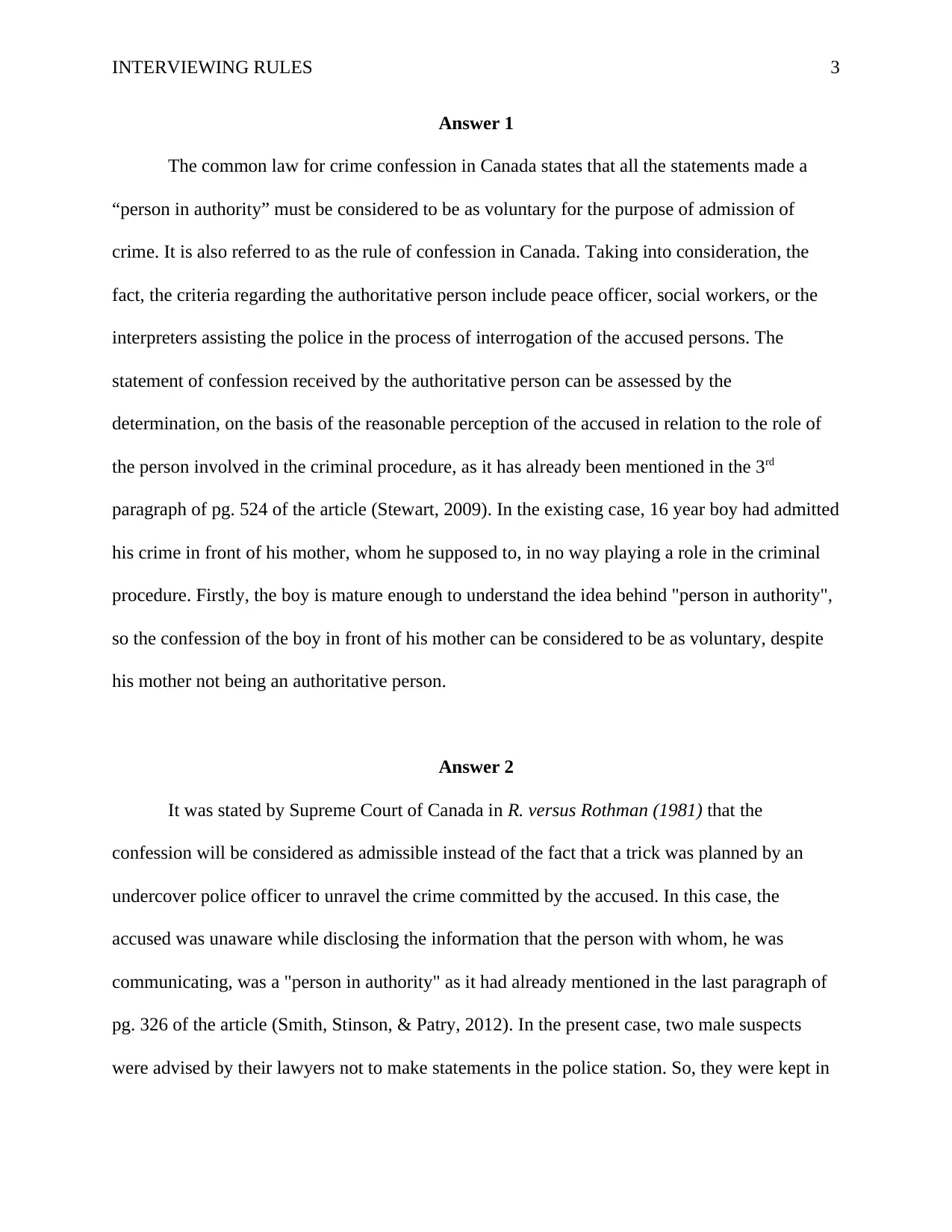
INTERVIEWING RULES 3
Answer 1
The common law for crime confession in Canada states that all the statements made a
“person in authority” must be considered to be as voluntary for the purpose of admission of
crime. It is also referred to as the rule of confession in Canada. Taking into consideration, the
fact, the criteria regarding the authoritative person include peace officer, social workers, or the
interpreters assisting the police in the process of interrogation of the accused persons. The
statement of confession received by the authoritative person can be assessed by the
determination, on the basis of the reasonable perception of the accused in relation to the role of
the person involved in the criminal procedure, as it has already been mentioned in the 3rd
paragraph of pg. 524 of the article (Stewart, 2009). In the existing case, 16 year boy had admitted
his crime in front of his mother, whom he supposed to, in no way playing a role in the criminal
procedure. Firstly, the boy is mature enough to understand the idea behind "person in authority",
so the confession of the boy in front of his mother can be considered to be as voluntary, despite
his mother not being an authoritative person.
Answer 2
It was stated by Supreme Court of Canada in R. versus Rothman (1981) that the
confession will be considered as admissible instead of the fact that a trick was planned by an
undercover police officer to unravel the crime committed by the accused. In this case, the
accused was unaware while disclosing the information that the person with whom, he was
communicating, was a "person in authority" as it had already mentioned in the last paragraph of
pg. 326 of the article (Smith, Stinson, & Patry, 2012). In the present case, two male suspects
were advised by their lawyers not to make statements in the police station. So, they were kept in
Answer 1
The common law for crime confession in Canada states that all the statements made a
“person in authority” must be considered to be as voluntary for the purpose of admission of
crime. It is also referred to as the rule of confession in Canada. Taking into consideration, the
fact, the criteria regarding the authoritative person include peace officer, social workers, or the
interpreters assisting the police in the process of interrogation of the accused persons. The
statement of confession received by the authoritative person can be assessed by the
determination, on the basis of the reasonable perception of the accused in relation to the role of
the person involved in the criminal procedure, as it has already been mentioned in the 3rd
paragraph of pg. 524 of the article (Stewart, 2009). In the existing case, 16 year boy had admitted
his crime in front of his mother, whom he supposed to, in no way playing a role in the criminal
procedure. Firstly, the boy is mature enough to understand the idea behind "person in authority",
so the confession of the boy in front of his mother can be considered to be as voluntary, despite
his mother not being an authoritative person.
Answer 2
It was stated by Supreme Court of Canada in R. versus Rothman (1981) that the
confession will be considered as admissible instead of the fact that a trick was planned by an
undercover police officer to unravel the crime committed by the accused. In this case, the
accused was unaware while disclosing the information that the person with whom, he was
communicating, was a "person in authority" as it had already mentioned in the last paragraph of
pg. 326 of the article (Smith, Stinson, & Patry, 2012). In the present case, two male suspects
were advised by their lawyers not to make statements in the police station. So, they were kept in
⊘ This is a preview!⊘
Do you want full access?
Subscribe today to unlock all pages.

Trusted by 1+ million students worldwide
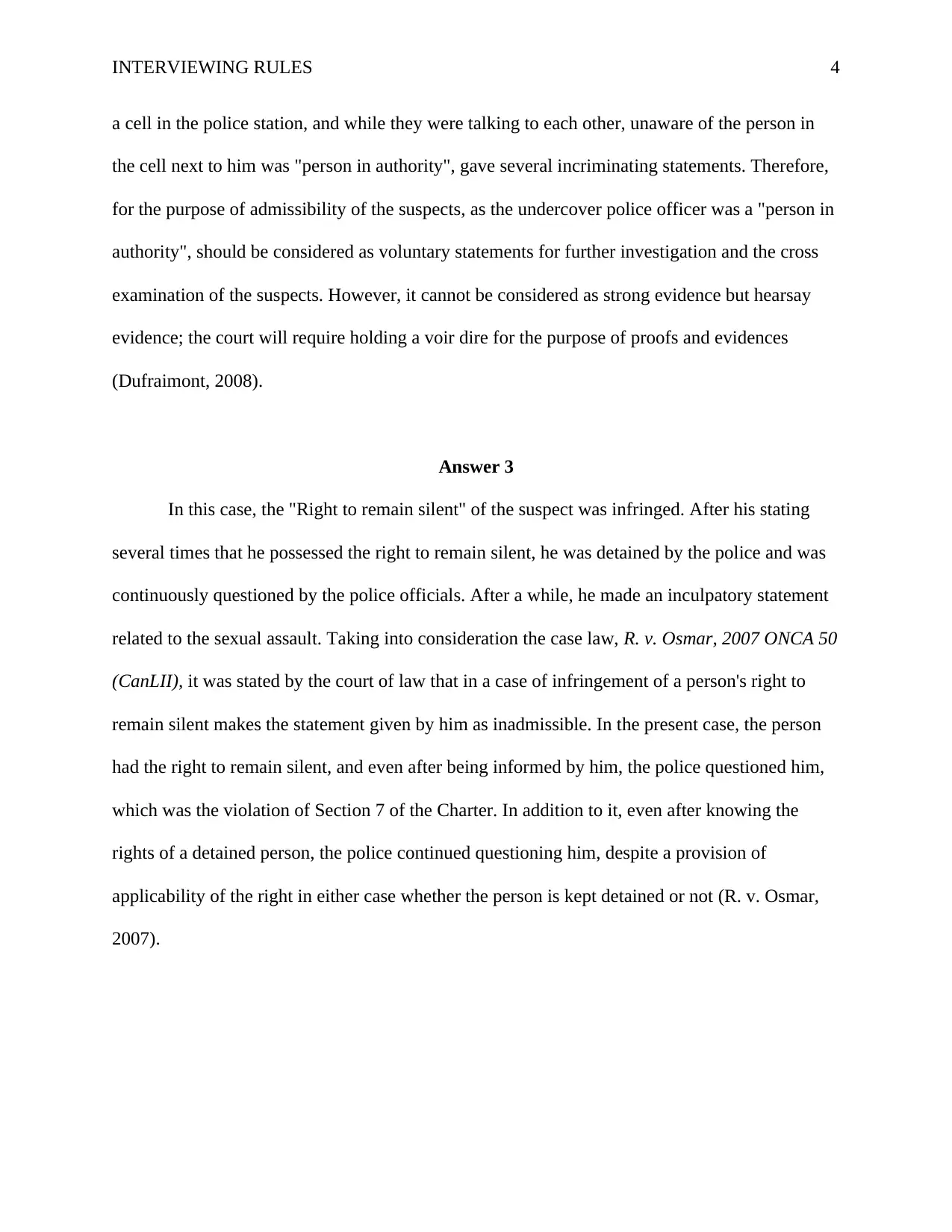
INTERVIEWING RULES 4
a cell in the police station, and while they were talking to each other, unaware of the person in
the cell next to him was "person in authority", gave several incriminating statements. Therefore,
for the purpose of admissibility of the suspects, as the undercover police officer was a "person in
authority", should be considered as voluntary statements for further investigation and the cross
examination of the suspects. However, it cannot be considered as strong evidence but hearsay
evidence; the court will require holding a voir dire for the purpose of proofs and evidences
(Dufraimont, 2008).
Answer 3
In this case, the "Right to remain silent" of the suspect was infringed. After his stating
several times that he possessed the right to remain silent, he was detained by the police and was
continuously questioned by the police officials. After a while, he made an inculpatory statement
related to the sexual assault. Taking into consideration the case law, R. v. Osmar, 2007 ONCA 50
(CanLII), it was stated by the court of law that in a case of infringement of a person's right to
remain silent makes the statement given by him as inadmissible. In the present case, the person
had the right to remain silent, and even after being informed by him, the police questioned him,
which was the violation of Section 7 of the Charter. In addition to it, even after knowing the
rights of a detained person, the police continued questioning him, despite a provision of
applicability of the right in either case whether the person is kept detained or not (R. v. Osmar,
2007).
a cell in the police station, and while they were talking to each other, unaware of the person in
the cell next to him was "person in authority", gave several incriminating statements. Therefore,
for the purpose of admissibility of the suspects, as the undercover police officer was a "person in
authority", should be considered as voluntary statements for further investigation and the cross
examination of the suspects. However, it cannot be considered as strong evidence but hearsay
evidence; the court will require holding a voir dire for the purpose of proofs and evidences
(Dufraimont, 2008).
Answer 3
In this case, the "Right to remain silent" of the suspect was infringed. After his stating
several times that he possessed the right to remain silent, he was detained by the police and was
continuously questioned by the police officials. After a while, he made an inculpatory statement
related to the sexual assault. Taking into consideration the case law, R. v. Osmar, 2007 ONCA 50
(CanLII), it was stated by the court of law that in a case of infringement of a person's right to
remain silent makes the statement given by him as inadmissible. In the present case, the person
had the right to remain silent, and even after being informed by him, the police questioned him,
which was the violation of Section 7 of the Charter. In addition to it, even after knowing the
rights of a detained person, the police continued questioning him, despite a provision of
applicability of the right in either case whether the person is kept detained or not (R. v. Osmar,
2007).
Paraphrase This Document
Need a fresh take? Get an instant paraphrase of this document with our AI Paraphraser
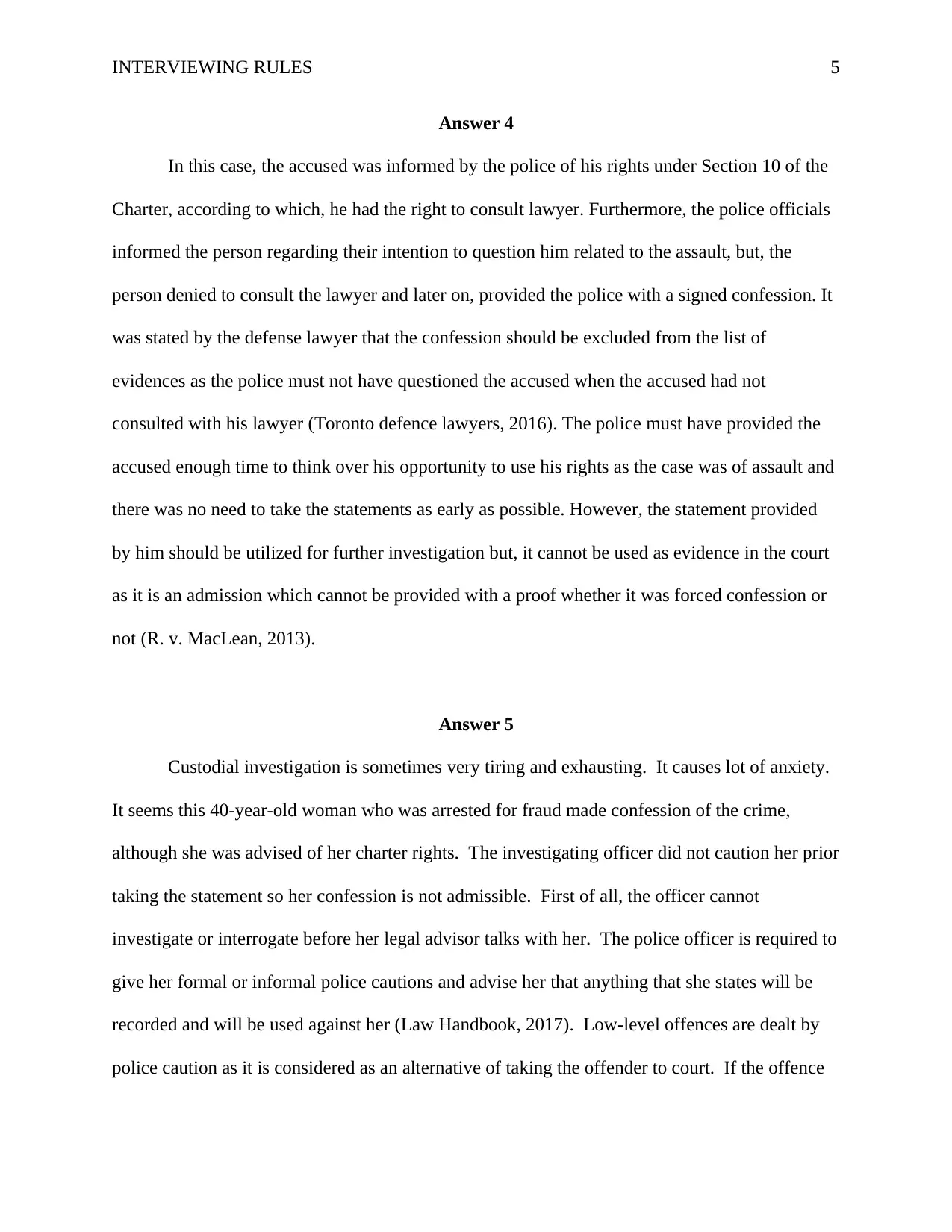
INTERVIEWING RULES 5
Answer 4
In this case, the accused was informed by the police of his rights under Section 10 of the
Charter, according to which, he had the right to consult lawyer. Furthermore, the police officials
informed the person regarding their intention to question him related to the assault, but, the
person denied to consult the lawyer and later on, provided the police with a signed confession. It
was stated by the defense lawyer that the confession should be excluded from the list of
evidences as the police must not have questioned the accused when the accused had not
consulted with his lawyer (Toronto defence lawyers, 2016). The police must have provided the
accused enough time to think over his opportunity to use his rights as the case was of assault and
there was no need to take the statements as early as possible. However, the statement provided
by him should be utilized for further investigation but, it cannot be used as evidence in the court
as it is an admission which cannot be provided with a proof whether it was forced confession or
not (R. v. MacLean, 2013).
Answer 5
Custodial investigation is sometimes very tiring and exhausting. It causes lot of anxiety.
It seems this 40-year-old woman who was arrested for fraud made confession of the crime,
although she was advised of her charter rights. The investigating officer did not caution her prior
taking the statement so her confession is not admissible. First of all, the officer cannot
investigate or interrogate before her legal advisor talks with her. The police officer is required to
give her formal or informal police cautions and advise her that anything that she states will be
recorded and will be used against her (Law Handbook, 2017). Low-level offences are dealt by
police caution as it is considered as an alternative of taking the offender to court. If the offence
Answer 4
In this case, the accused was informed by the police of his rights under Section 10 of the
Charter, according to which, he had the right to consult lawyer. Furthermore, the police officials
informed the person regarding their intention to question him related to the assault, but, the
person denied to consult the lawyer and later on, provided the police with a signed confession. It
was stated by the defense lawyer that the confession should be excluded from the list of
evidences as the police must not have questioned the accused when the accused had not
consulted with his lawyer (Toronto defence lawyers, 2016). The police must have provided the
accused enough time to think over his opportunity to use his rights as the case was of assault and
there was no need to take the statements as early as possible. However, the statement provided
by him should be utilized for further investigation but, it cannot be used as evidence in the court
as it is an admission which cannot be provided with a proof whether it was forced confession or
not (R. v. MacLean, 2013).
Answer 5
Custodial investigation is sometimes very tiring and exhausting. It causes lot of anxiety.
It seems this 40-year-old woman who was arrested for fraud made confession of the crime,
although she was advised of her charter rights. The investigating officer did not caution her prior
taking the statement so her confession is not admissible. First of all, the officer cannot
investigate or interrogate before her legal advisor talks with her. The police officer is required to
give her formal or informal police cautions and advise her that anything that she states will be
recorded and will be used against her (Law Handbook, 2017). Low-level offences are dealt by
police caution as it is considered as an alternative of taking the offender to court. If the offence
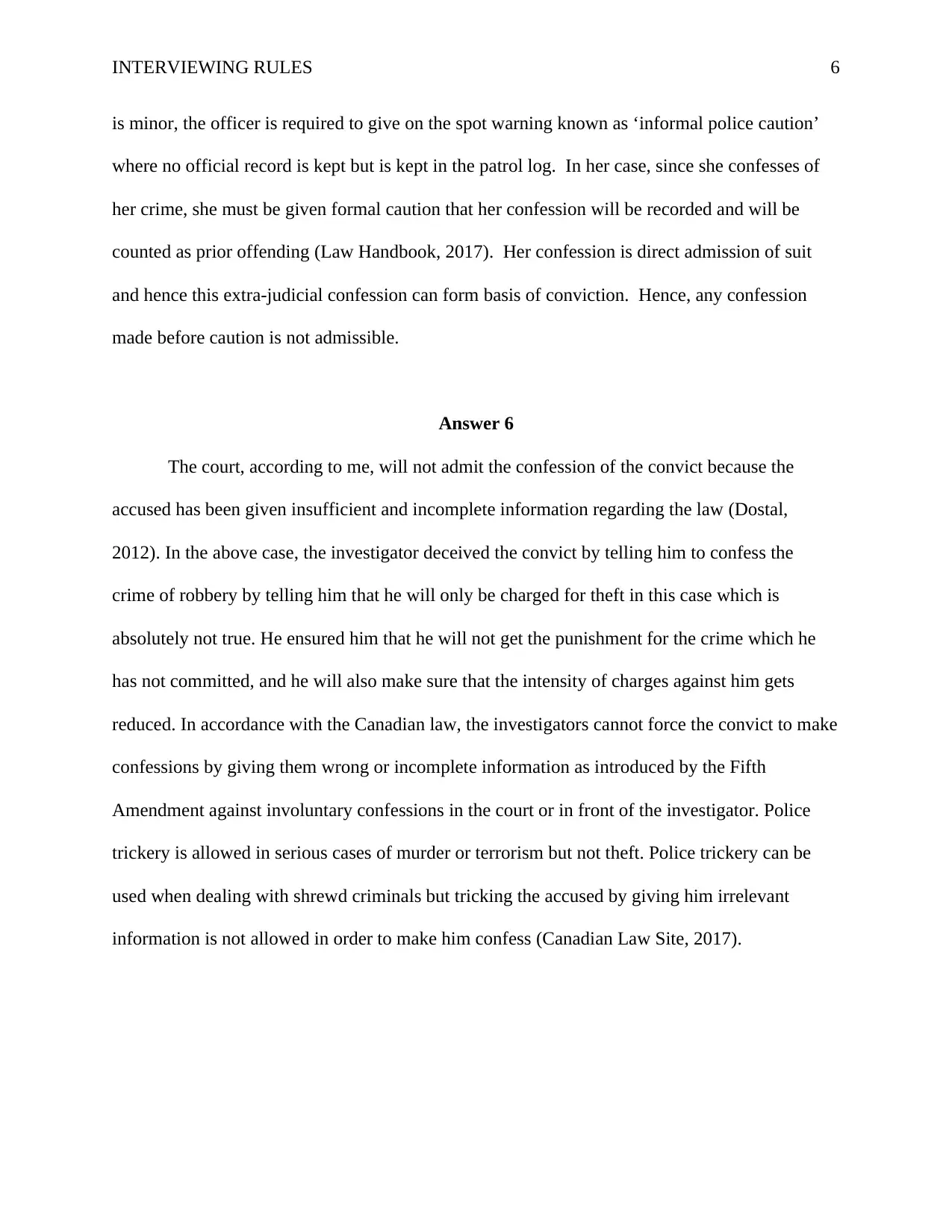
INTERVIEWING RULES 6
is minor, the officer is required to give on the spot warning known as ‘informal police caution’
where no official record is kept but is kept in the patrol log. In her case, since she confesses of
her crime, she must be given formal caution that her confession will be recorded and will be
counted as prior offending (Law Handbook, 2017). Her confession is direct admission of suit
and hence this extra-judicial confession can form basis of conviction. Hence, any confession
made before caution is not admissible.
Answer 6
The court, according to me, will not admit the confession of the convict because the
accused has been given insufficient and incomplete information regarding the law (Dostal,
2012). In the above case, the investigator deceived the convict by telling him to confess the
crime of robbery by telling him that he will only be charged for theft in this case which is
absolutely not true. He ensured him that he will not get the punishment for the crime which he
has not committed, and he will also make sure that the intensity of charges against him gets
reduced. In accordance with the Canadian law, the investigators cannot force the convict to make
confessions by giving them wrong or incomplete information as introduced by the Fifth
Amendment against involuntary confessions in the court or in front of the investigator. Police
trickery is allowed in serious cases of murder or terrorism but not theft. Police trickery can be
used when dealing with shrewd criminals but tricking the accused by giving him irrelevant
information is not allowed in order to make him confess (Canadian Law Site, 2017).
is minor, the officer is required to give on the spot warning known as ‘informal police caution’
where no official record is kept but is kept in the patrol log. In her case, since she confesses of
her crime, she must be given formal caution that her confession will be recorded and will be
counted as prior offending (Law Handbook, 2017). Her confession is direct admission of suit
and hence this extra-judicial confession can form basis of conviction. Hence, any confession
made before caution is not admissible.
Answer 6
The court, according to me, will not admit the confession of the convict because the
accused has been given insufficient and incomplete information regarding the law (Dostal,
2012). In the above case, the investigator deceived the convict by telling him to confess the
crime of robbery by telling him that he will only be charged for theft in this case which is
absolutely not true. He ensured him that he will not get the punishment for the crime which he
has not committed, and he will also make sure that the intensity of charges against him gets
reduced. In accordance with the Canadian law, the investigators cannot force the convict to make
confessions by giving them wrong or incomplete information as introduced by the Fifth
Amendment against involuntary confessions in the court or in front of the investigator. Police
trickery is allowed in serious cases of murder or terrorism but not theft. Police trickery can be
used when dealing with shrewd criminals but tricking the accused by giving him irrelevant
information is not allowed in order to make him confess (Canadian Law Site, 2017).
⊘ This is a preview!⊘
Do you want full access?
Subscribe today to unlock all pages.

Trusted by 1+ million students worldwide
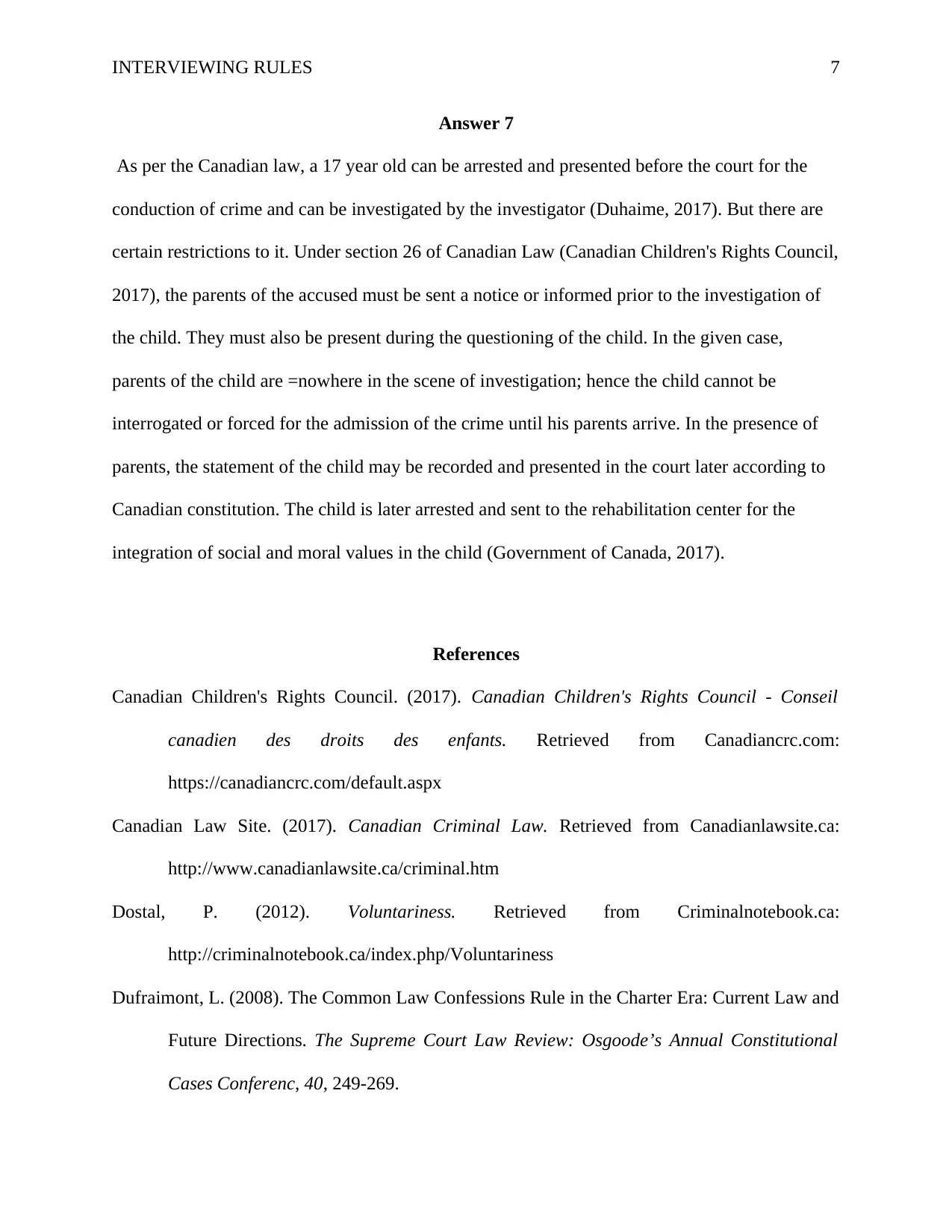
INTERVIEWING RULES 7
Answer 7
As per the Canadian law, a 17 year old can be arrested and presented before the court for the
conduction of crime and can be investigated by the investigator (Duhaime, 2017). But there are
certain restrictions to it. Under section 26 of Canadian Law (Canadian Children's Rights Council,
2017), the parents of the accused must be sent a notice or informed prior to the investigation of
the child. They must also be present during the questioning of the child. In the given case,
parents of the child are =nowhere in the scene of investigation; hence the child cannot be
interrogated or forced for the admission of the crime until his parents arrive. In the presence of
parents, the statement of the child may be recorded and presented in the court later according to
Canadian constitution. The child is later arrested and sent to the rehabilitation center for the
integration of social and moral values in the child (Government of Canada, 2017).
References
Canadian Children's Rights Council. (2017). Canadian Children's Rights Council - Conseil
canadien des droits des enfants. Retrieved from Canadiancrc.com:
https://canadiancrc.com/default.aspx
Canadian Law Site. (2017). Canadian Criminal Law. Retrieved from Canadianlawsite.ca:
http://www.canadianlawsite.ca/criminal.htm
Dostal, P. (2012). Voluntariness. Retrieved from Criminalnotebook.ca:
http://criminalnotebook.ca/index.php/Voluntariness
Dufraimont, L. (2008). The Common Law Confessions Rule in the Charter Era: Current Law and
Future Directions. The Supreme Court Law Review: Osgoode’s Annual Constitutional
Cases Conferenc, 40, 249-269.
Answer 7
As per the Canadian law, a 17 year old can be arrested and presented before the court for the
conduction of crime and can be investigated by the investigator (Duhaime, 2017). But there are
certain restrictions to it. Under section 26 of Canadian Law (Canadian Children's Rights Council,
2017), the parents of the accused must be sent a notice or informed prior to the investigation of
the child. They must also be present during the questioning of the child. In the given case,
parents of the child are =nowhere in the scene of investigation; hence the child cannot be
interrogated or forced for the admission of the crime until his parents arrive. In the presence of
parents, the statement of the child may be recorded and presented in the court later according to
Canadian constitution. The child is later arrested and sent to the rehabilitation center for the
integration of social and moral values in the child (Government of Canada, 2017).
References
Canadian Children's Rights Council. (2017). Canadian Children's Rights Council - Conseil
canadien des droits des enfants. Retrieved from Canadiancrc.com:
https://canadiancrc.com/default.aspx
Canadian Law Site. (2017). Canadian Criminal Law. Retrieved from Canadianlawsite.ca:
http://www.canadianlawsite.ca/criminal.htm
Dostal, P. (2012). Voluntariness. Retrieved from Criminalnotebook.ca:
http://criminalnotebook.ca/index.php/Voluntariness
Dufraimont, L. (2008). The Common Law Confessions Rule in the Charter Era: Current Law and
Future Directions. The Supreme Court Law Review: Osgoode’s Annual Constitutional
Cases Conferenc, 40, 249-269.
Paraphrase This Document
Need a fresh take? Get an instant paraphrase of this document with our AI Paraphraser
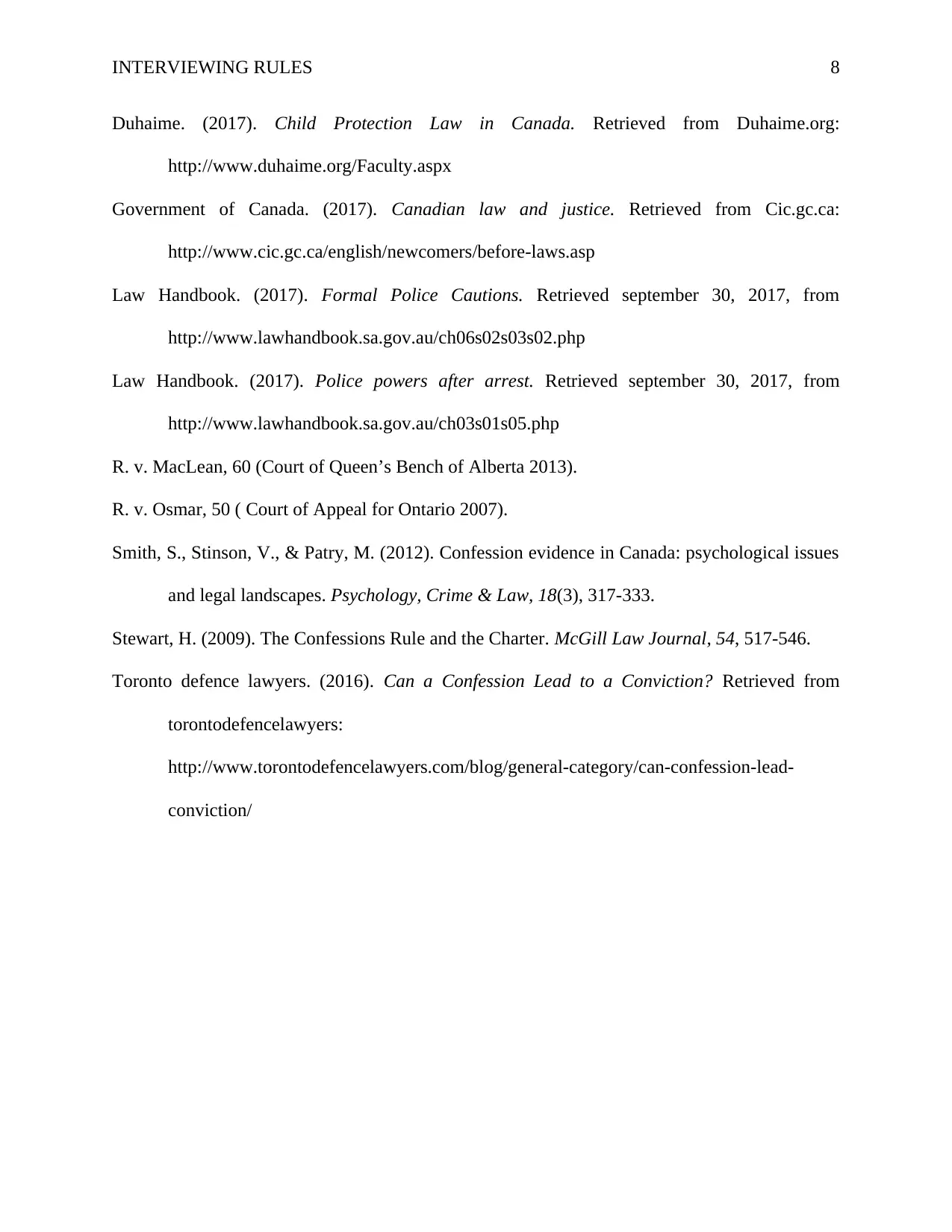
INTERVIEWING RULES 8
Duhaime. (2017). Child Protection Law in Canada. Retrieved from Duhaime.org:
http://www.duhaime.org/Faculty.aspx
Government of Canada. (2017). Canadian law and justice. Retrieved from Cic.gc.ca:
http://www.cic.gc.ca/english/newcomers/before-laws.asp
Law Handbook. (2017). Formal Police Cautions. Retrieved september 30, 2017, from
http://www.lawhandbook.sa.gov.au/ch06s02s03s02.php
Law Handbook. (2017). Police powers after arrest. Retrieved september 30, 2017, from
http://www.lawhandbook.sa.gov.au/ch03s01s05.php
R. v. MacLean, 60 (Court of Queen’s Bench of Alberta 2013).
R. v. Osmar, 50 ( Court of Appeal for Ontario 2007).
Smith, S., Stinson, V., & Patry, M. (2012). Confession evidence in Canada: psychological issues
and legal landscapes. Psychology, Crime & Law, 18(3), 317-333.
Stewart, H. (2009). The Confessions Rule and the Charter. McGill Law Journal, 54, 517-546.
Toronto defence lawyers. (2016). Can a Confession Lead to a Conviction? Retrieved from
torontodefencelawyers:
http://www.torontodefencelawyers.com/blog/general-category/can-confession-lead-
conviction/
Duhaime. (2017). Child Protection Law in Canada. Retrieved from Duhaime.org:
http://www.duhaime.org/Faculty.aspx
Government of Canada. (2017). Canadian law and justice. Retrieved from Cic.gc.ca:
http://www.cic.gc.ca/english/newcomers/before-laws.asp
Law Handbook. (2017). Formal Police Cautions. Retrieved september 30, 2017, from
http://www.lawhandbook.sa.gov.au/ch06s02s03s02.php
Law Handbook. (2017). Police powers after arrest. Retrieved september 30, 2017, from
http://www.lawhandbook.sa.gov.au/ch03s01s05.php
R. v. MacLean, 60 (Court of Queen’s Bench of Alberta 2013).
R. v. Osmar, 50 ( Court of Appeal for Ontario 2007).
Smith, S., Stinson, V., & Patry, M. (2012). Confession evidence in Canada: psychological issues
and legal landscapes. Psychology, Crime & Law, 18(3), 317-333.
Stewart, H. (2009). The Confessions Rule and the Charter. McGill Law Journal, 54, 517-546.
Toronto defence lawyers. (2016). Can a Confession Lead to a Conviction? Retrieved from
torontodefencelawyers:
http://www.torontodefencelawyers.com/blog/general-category/can-confession-lead-
conviction/
1 out of 8
Related Documents
Your All-in-One AI-Powered Toolkit for Academic Success.
+13062052269
info@desklib.com
Available 24*7 on WhatsApp / Email
![[object Object]](/_next/static/media/star-bottom.7253800d.svg)
Unlock your academic potential
Copyright © 2020–2026 A2Z Services. All Rights Reserved. Developed and managed by ZUCOL.



